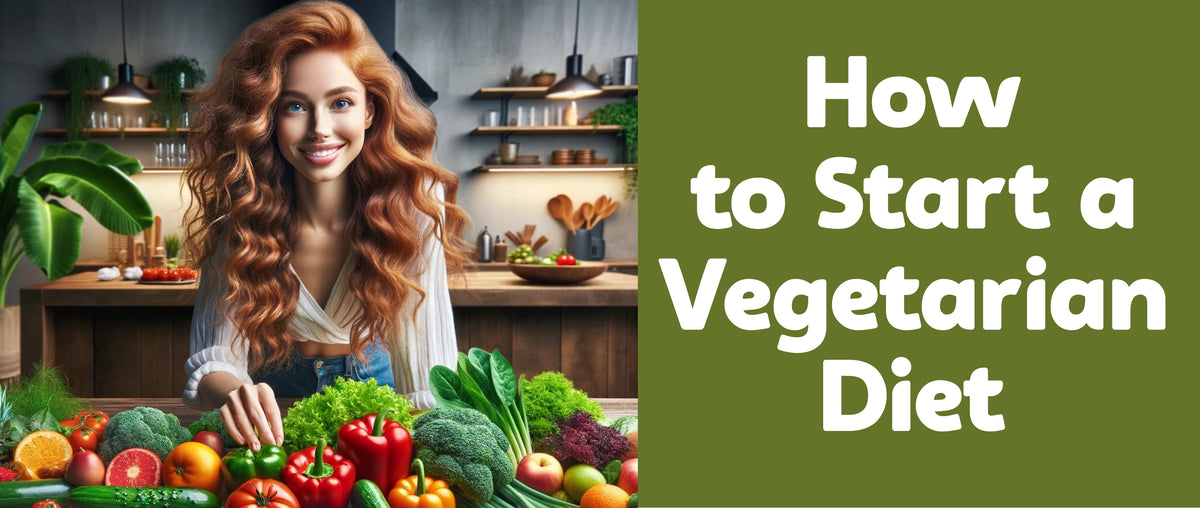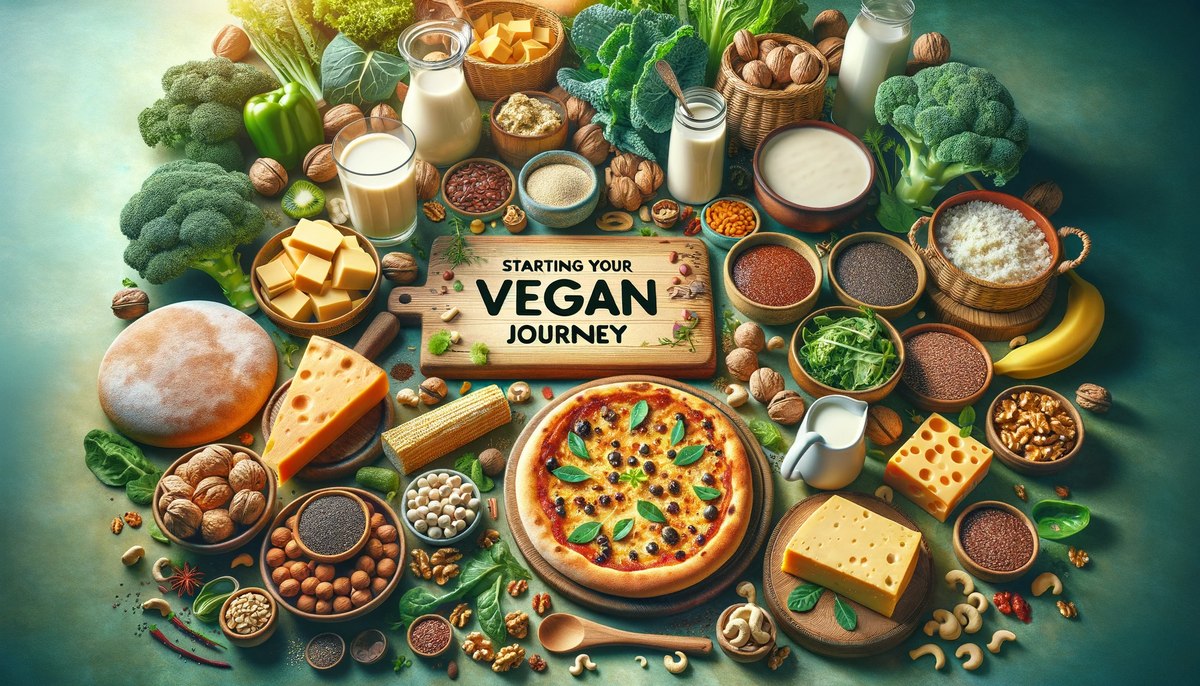How to Start a Vegetarian Diet
Adopting a vegetarian diet can be a transformative step toward a healthier lifestyle. A well-balanced vegetarian diet not only supports overall well-being but also offers numerous health benefits, including weight management, muscle recovery, and improved digestion. This guide will help you understand the essentials of starting a vegetarian diet and how to maintain a healthy diet as a vegetarian.
Key Takeaways
- Vegetarian diets can support weight loss, muscle recovery, and overall health.
- There are various types of vegetarian diets to choose from.
- It's important to include a variety of nutrient-dense foods to ensure nutritional adequacy.
- Practical tips and sample meal plans can help ease the transition to a vegetarian diet.
What Is a Vegetarian Diet?
A vegetarian diet is one that excludes meat, poultry, and fish. It emphasizes plant-based foods, including fruits, vegetables, legumes, nuts, seeds, and whole grains. The diet can be adapted to meet individual preferences and nutritional needs.
Types of Vegetarian Diets
There are several types of vegetarian diets. Lacto-vegetarians include dairy products but exclude eggs, meat, and fish. Ovo-vegetarians include eggs but exclude dairy, meat, and fish. Lacto-ovo vegetarians include both dairy products and eggs but exclude meat and fish. Vegans exclude all animal products, including dairy, eggs, and honey. Lastly, flexitarians primarily follow a plant-based diet but occasionally include meat and fish.

Choosing Your Vegetarian Diet
When deciding on a vegetarian diet, consider your personal health goals and lifestyle. Whether you're aiming for weight loss, improved muscle recovery, or overall health, selecting the right type of vegetarian diet is crucial. For instance, if you are lactose intolerant, a vegan diet or ovo-vegetarian diet may be more suitable for you.
The Benefits to Going Vegetarian
Switching to a vegetarian diet offers numerous benefits. Health-wise, a vegetarian diet can lower the risk of chronic diseases such as heart disease, diabetes, and certain cancers. It can also aid in weight loss and improve digestion. Environmentally, plant based diet have a lower carbon footprint and help reduce resource consumption. Ethically, many people choose vegetarianism to avoid contributing to animal cruelty and exploitation.
Nutrient Considerations
Ensuring you get all the necessary nutrients is key to maintaining a healthy vegetarian diet. Protein sources such as legumes, nuts, seeds, soy products, and whole grains are essential. Important vitamins and minerals include Vitamin B12, iron, calcium, and omega-3 fatty acids. These nutrients can be found in fortified foods, leafy greens, tofu, flaxseeds, and walnuts. Consider taking a multivitamin or specific supplements for nutrients like B12, iron, and omega-3 fatty acids if necessary.
What to Eat on a Vegetarian Diet
A balanced vegetarian diet should include a variety of nutrient-dense foods. Plant-based proteins such as beans, lentils, tofu, tempeh, and seitan are excellent choices. Fruits and vegetables should be consumed in a colorful variety to ensure a range of nutrients. Whole grains like brown rice, quinoa, oats, and barley provide essential fiber and nutrients. Nuts and seeds such as almonds, sunflower seeds, and pumpkin seeds are great for healthy fats and additional protein.
Foods to Avoid
To maintain a healthy vegetarian diet, avoid animal products like meat, poultry, fish, and their by-products. Processed foods high in sodium, sugars, and unhealthy fats should also be limited. Additionally, high-sugar foods such as sweets, sugary drinks, and desserts should be consumed in moderation.
Tips for Starting a Vegetarian Diet
Starting a vegetarian diet can feel overwhelming, but with a few practical tips, the transition can be smooth and enjoyable. Here are some key strategies to help you get started:
Start Slowly:
Transitioning to a vegetarian diet doesn't have to happen overnight. Begin by incorporating more plant-based meals into your diet gradually. You might start with Meatless Mondays and then add more vegetarian days as you become comfortable with new recipes and ingredients.
Educate Yourself:
Understanding the basics of nutrition is essential for maintaining a healthy vegetarian diet. Learn about different plant-based protein sources, essential vitamins, and minerals to ensure you're meeting your nutritional needs. Resources like the Mayo Clinic and Healthline offer valuable information on vegetarian nutrition.
Plan Your Meals:
Meal planning is crucial when starting a vegetarian diet. Plan your meals and snacks for the week to ensure you have all the necessary ingredients on hand. This will help you avoid the temptation of convenience foods that might not be as healthy.
Experiment with Recipes:
Explore a variety of vegetarian recipes to keep your meals exciting and flavorful. Try new ingredients and cooking methods to discover what you enjoy the most. Websites like Grabenord's recipe blog offer a plethora of delicious vegetarian dishes to try.
Focus on Whole Foods:
Prioritize whole, minimally processed foods in your diet. Fruits, vegetables, whole grains, nuts, seeds, and legumes should form the foundation of your meals. These foods are nutrient-dense and support overall health.
Stay Hydrated:
Proper hydration is vital for health, especially when consuming a high-fiber diet. Drink plenty of water throughout the day, and include hydrating foods like fruits and vegetables in your diet.
Seek Support:
Joining a community of like-minded individuals can provide motivation and support. Look for vegetarian groups online or in your local area where you can share experiences, recipes, and tips.
Also Read
Healthy Eating as a Vegetarian
Eating a balanced vegetarian diet involves more than just avoiding meat. It's about making nutritious choices that support your overall health. Here's how to maintain a healthy vegetarian diet:
Balanced Meals
Aim to create balanced meals that include a variety of food groups. A typical vegetarian plate should have:
- Protein: Include plant based proteins like beans, lentils, tofu, tempeh, and seitan.
- Vegetables: Fill half your plate with a colorful variety of vegetables.
- Whole Grains: Include whole grains like brown rice, quinoa, oats, and barley.
- Healthy Fats: Add healthy fats from nuts, seeds, avocados, and olive oil.
Nutrient-Rich Foods
Focus on nutrient-rich foods to ensure you're getting all the vitamins and minerals your body needs. For instance, leafy greens like spinach and kale are excellent sources of iron and calcium. Fortified plant milks and cereals can help you meet your Vitamin B12 needs.
Healthy Snacks for Kids
If you have children, providing healthy snacks is essential. Opt for snacks like fresh fruit, vegetable sticks with hummus, yogurt with berries, and whole-grain crackers with vegan cheese. These options are nutritious and help maintain energy levels throughout the day.
High-Protein Snacks
For those looking to boost their protein intake, high protein snacks are a great option. Nuts, seeds, edamame, and protein bars made from plant-based ingredients can help meet your protein needs, especially important for muscle recovery after workouts.
Low-Calorie Foods
Including low-calorie foods in your diet can aid in weight management. Vegetables like cucumbers, lettuce, and tomatoes are low in calories but high in nutrients. These foods can be enjoyed in large quantities without contributing to weight gain.
Kombucha and Healthy Drinks
Staying hydrated with healthy drinks is crucial. Kombucha, a fermented tea, is a great option as it contains probiotics that support gut health. Other healthy drink choices include herbal teas, infused water, and plant-based milk.
Incorporating Vegan Cheese
Vegan cheese has come a long way and now offers delicious options that can easily replace dairy cheese. Brands like Grabenord offer a variety of vegan cheeses that can be used in sandwiches, salads, and cooking.
Plant-Based Diet for Overall Health
Adopting a plant-based diet can significantly improve your health. Plant-based diets are rich in fiber, antioxidants, and phytonutrients that support heart health, reduce inflammation, and promote a healthy weight. For a comprehensive guide, check out Grabenord's plant-based collection.
Best Foods for Weight Loss
- Leafy Greens: Spinach, kale, and arugula are low in calories but high in vitamins and minerals.
- Berries: Blueberries, strawberries, and raspberries are high in fiber and antioxidants.
- Whole Grains: Quinoa, brown rice, and oats provide sustained energy and help you feel full longer.
- Legumes: Beans, lentils, and chickpeas are rich in protein and fiber, aiding in satiety and weight loss.
Sample Meal Plan
Creating a well-rounded meal plan is essential for ensuring you get all the nutrients you need while following a vegetarian diet. Here's a sample meal plan to get you started:
Breakfast Ideas
1. Overnight Oats: Combine rolled oats, chia seeds, almond milk, and fresh berries. Let it sit overnight and enjoy a nutritious, ready-to-eat breakfast in the morning.
2. Smoothie Bowl: Blend spinach, frozen bananas, berries, and plant-based protein powder. Top with granola, chia seeds, and sliced fruits.
3. Avocado Toast: Spread mashed avocado on whole-grain toast and sprinkle with cherry tomatoes, salt, and pepper. Add a side of fruit for a complete meal.
Lunch Ideas
Quinoa Salad: Mix cooked quinoa with black beans, corn, diced bell peppers, and a lime-cilantro dressing. Add avocado slices for healthy fats.
Veggie Wrap: Fill a whole-grain tortilla with hummus, shredded carrots, spinach, cucumbers, and bell peppers. Serve with a side of fresh fruit or a small salad.
Lentil Soup: Prepare a hearty lentil soup with tomatoes, carrots, celery, and spices. Pair it with a slice of whole-grain bread.
Dinner Ideas
Stir-Fried Tofu and Vegetables: Sauté tofu cubes with a mix of your favorite vegetables in a soy-ginger sauce. Serve over brown rice or quinoa.
Stuffed Bell Peppers: Fill bell peppers with a mixture of brown rice, black beans, corn, and salsa. Bake until tender and top with a sprinkle of vegan cheese.
Chickpea Curry: Cook chickpeas in a tomato-based curry sauce with coconut milk, spinach, and spices. Serve with basmati rice or naan bread.
Snacks
High-Protein Snacks: Snack on roasted chickpeas, mixed nuts, or a protein bar made from plant-based ingredients.
Healthy Snacks for Kids: Offer fresh fruit, vegetable sticks with hummus, or whole-grain crackers with vegan cheese.
Low-Calorie Options: Enjoy crunchy veggies like cucumber slices, cherry tomatoes, and baby carrots with a light dip.
Healthy Drinks
Kombucha : A fermented tea rich in probiotics, which can support digestive health.
Herbal Teas: Chamomile, peppermint, and green tea are excellent choices for hydration and overall well-being.
Plant-Based Milk: Almond, soy, and oat milk are great alternatives to dairy milk and can be used in smoothies, cereals, or enjoyed on their own.

Tips for Success
Transitioning to and maintaining a vegetarian diet can be smooth with a few practical tips. Here are some strategies to help you succeed:
Meal Prepping
Planning and preparing your meals in advance can save time and ensure you always have healthy options available. Set aside time each week to plan your meals, create a shopping list, and prepare ingredients. Batch cooking grains, roasting vegetables, and making large batches of soups or stews can make mealtime more convenient.
Reading Food Labels
Understanding food labels is essential for identifying hidden animal products and ensuring you're choosing healthy options. Look for ingredients like gelatin, casein, and whey, which are derived from animals. Opt for whole foods with minimal ingredients and avoid highly processed items with added sugars and unhealthy fats.
Dining Out as a Vegetarian
Eating out as a vegetarian can be enjoyable with a little preparation. Research vegetarian-friendly restaurants or check the menu online before going out. Don't hesitate to ask the server about vegetarian options or request modifications to make a dish vegetarian-friendly.
Handling Social Situations
Social situations can sometimes be challenging when following a vegetarian diet. Communicate your dietary preferences to friends and family in advance, and offer to bring a vegetarian dish to share. This ensures you have something to eat and introduces others to delicious vegetarian options.
Dealing with Cravings
Cravings for meat or other animal products can be common when transitioning to a vegetarian diet. To manage cravings, focus on satisfying your hunger with nutrient-dense foods. Incorporate high-protein snacks like nuts, seeds, and legumes to stay full longer. Experimenting with meat substitutes and new recipes can also help reduce cravings.
Ensuring Nutrient Adequacy
To ensure you're meeting your nutritional needs, include a variety of foods in your diet. Eat a rainbow of fruits and vegetables, incorporate different plant-based protein sources, and consider fortified foods or supplements for nutrients like Vitamin B12, iron, and omega-3 fatty acids.
Staying Motivated
Maintaining motivation is key to sticking with a vegetarian diet. Remind yourself of the benefits, such as improved health, environmental impact, and ethical considerations. Connect with a community of fellow vegetarians for support and inspiration. Celebrate your progress and enjoy the journey of discovering new foods and recipes.
Common Challenges and How to Overcome Them
Transitioning to a vegetarian diet can come with its own set of challenges, but with the right strategies, these can be effectively managed. Here are some common challenges and how to overcome them:
Dealing with Cravings
Cravings for meat or other animal products can be a hurdle, especially in the early stages of transitioning. To manage cravings, ensure you are consuming enough protein and healthy fats to stay full and satisfied. High-protein snacks like nuts, seeds, and legumes can help curb hunger. Experimenting with meat substitutes, such as tempeh, tofu, and seitan, can also provide the textures and flavors you might miss. Additionally, keeping a variety of tasty vegetarian recipes at hand can make your meals more enjoyable and fulfilling.
Ensuring Nutrient Adequacy
One of the main concerns when switching to a vegetarian diet is ensuring that all nutritional needs are met. Key nutrients to focus on include protein, iron, calcium, vitamin B12, and omega-3 fatty acids. Incorporate a wide range of plant-based foods to cover these nutrients. For instance, dark leafy greens, beans, lentils, fortified cereals, and plant-based milks can help you meet your dietary requirements. Consider using supplements for nutrients like vitamin B12 and omega-3s if needed. Regularly monitoring your health with a healthcare professional can also help address any deficiencies promptly.
Staying Motivated
Maintaining motivation can be challenging, especially when faced with social pressures or dietary monotony. Reminding yourself of the reasons why you chose a vegetarian lifestyle can help keep you motivated. Whether it's for health, environmental, or ethical reasons, reconnecting with your goals can provide a boost. Engaging with a supportive community, either online or in person, can offer encouragement and inspiration. Trying new recipes, discovering new restaurants, and sharing meals with friends can also make the journey more enjoyable and less isolating.
Handling Social Situations
Social situations, such as family gatherings or dining out, can be challenging for vegetarians. Communicate your dietary preferences in advance to ensure there are suitable options available. Offering to bring a vegetarian dish to share can not only ensure you have something to eat but also introduce others to delicious vegetarian food. When dining out, researching restaurant menus ahead of time or asking the server about vegetarian options can make the experience smoother.
Conclusion
Switching to a vegetarian diet is a significant lifestyle change that can offer numerous health benefits, environmental advantages, and ethical satisfaction. By choosing the right type of vegetarian diet, ensuring nutritional adequacy, and incorporating a variety of foods, you can enjoy a balanced and fulfilling diet. Remember to start slowly, educate yourself, and plan your meals to ease the transition. With these tips and strategies, you'll be well on your way to thriving on a vegetarian diet.
In summary, a vegetarian diet can support weight loss, muscle recovery, and overall health while contributing positively to the environment and animal welfare. With careful planning and a focus on whole, nutrient-dense foods, you can achieve your health goals and enjoy the journey of exploring new culinary horizons.
Craving a delicious vegan meal? Look no further! We've got a guide to the best vegan restaurants in India, ready to help you discover amazing plant-based eats in your city.










